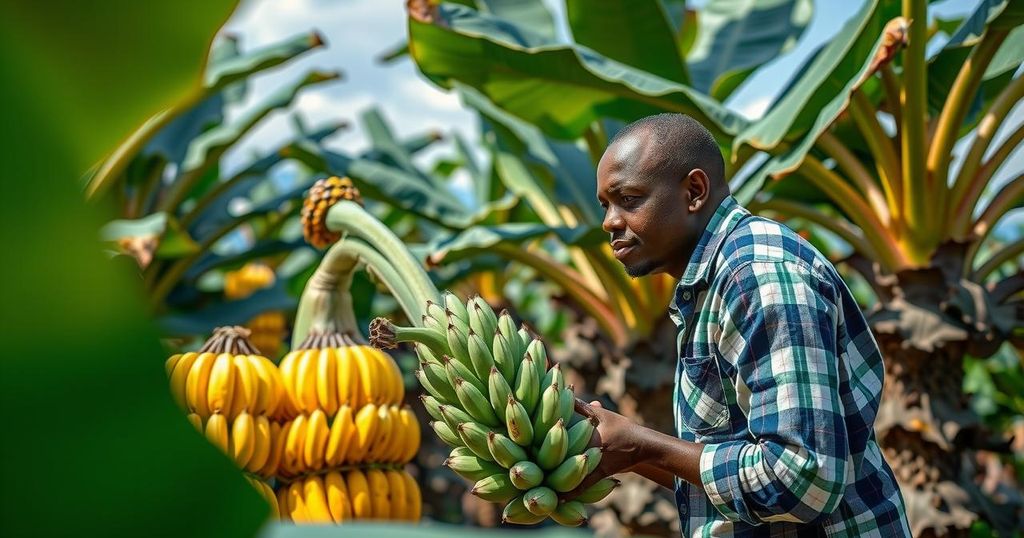Innovative Insurance Solutions for Uganda’s Banana Farmers Facing Climate Challenges

Ahumwire Justine, a banana farmer in Uganda, suffered severe losses due to extreme weather exacerbated by climate change. The NDC Action Project, in collaboration with UNEP, is providing crop insurance to farmers, allowing them to document damage via smartphones and receive timely compensation. Training on water management and agroforestry further supports farmers, enhancing productivity and resilience. This initiative aims to expand coverage to 50,000 banana farmers across Uganda, offering vital financial protection and peace of mind.
In Uganda’s southwestern region, banana farmer Ahumwire Justine faced a severe crisis when a destructive rain and hailstorm devastated her plantation. The storm not only destroyed 300 banana trees but also resulted in the loss of two of her cows, leaving her family contemplating abandoning their two-hectare property due to financial hardship from the damages. With no food or money for essential needs such as school fees for her children, Justine’s predicament highlighted the increasing vulnerability of farmers like her to extreme weather, exacerbated by climate change. Recognizing the plight of smallholder farmers, the NDC Action Project, a collaboration between the United Nations Environment Programme (UNEP) and the UNEP Copenhagen Climate Centre, aims to provide a safety net for vulnerable agricultural communities. Mirey Atallah, Chief of the Adaptation and Resilience Branch within UNEP’s Climate Change Division, described the pressing need for initiatives that combine technical and financial mechanisms to enhance farmers’ resilience to climate change-induced disasters. Bananas hold significant economic importance in Uganda, with nearly half of the farming population engaged in their cultivation. The adverse effects of climate change have made weather patterns unpredictable, as farmers are increasingly faced with contrasting cycles of prolonged rainfall followed by extended dry spells. “We could have two years of non-stop rain, and then six months with no rain at all,” noted Florence Muranga, Director of the Banana Industrial Research and Development Centre, emphasizing the dire consequences that can unfold in a single day. The centre represents a collective of 5,000 banana farmers and plays a pivotal role in expanding access to crop insurance alongside UNEP. An initial cohort of 930 farmers has been trained to use smartphones to report damages via a digital platform where agroeconomists assess claims. Nearly half of these farmers are women, demonstrating an inclusive approach in the insurance initiative. By leveraging technology, the process minimizes the need for in-person inspections, expediting claims processing and reducing insurance premiums. Farmers are also educated on water management and agroforestry practices, resulting in remarkable productivity improvements and a reduction in climate-related losses. This comprehensive training not only mitigates the insurance payout risk for providers but also gives banks confidence to extend financial support to farmers. As a result of the positive outcomes from this pilot phase, the program is set to be rolled out to all 5,000 affiliated farmers, with ambitions to ultimately cover 50,000 banana producers nationwide. For Justine, this insurance scheme provides invaluable peace of mind: “I know that if [my crops get damaged] I have help. It is not like in other years, where I would have to start from zero.” UNEP actively contributes to meeting the goals established by the Paris Agreement, striving to limit the global temperature rise to below 2°C, and preferably to 1.5°C, in comparison to pre-industrial levels. In alignment with such objectives, UNEP has formulated the Sectoral Solution, a strategic roadmap aimed at reducing emissions across key sectors, including energy, industry, agriculture and food systems, forests and land use, transportation, and urban environments.
The context of this article revolves around the intersection of agriculture and climate change in Uganda, particularly focusing on the challenges faced by banana farmers as a result of increasingly extreme weather patterns. The evidence of climate change is demonstrated through the erratic weather that has led to both droughts and excessive rainfall, leaving farmers vulnerable to substantial agricultural losses. The NDC Action Project emerges as a response to these challenges, aiming to equip farmers with innovative tools for mitigating risks related to crop failures caused by weather extremes. This initiative not only offers a safety net through insurance but also promotes improved agricultural practices and resilience among the farming community, ultimately contributing to the broader goal of climate adaptation and sustainable development.
In conclusion, the introduction of a novel insurance scheme for banana farmers in Uganda represents a proactive measure against the adverse impacts of climate change. Through technology-driven approaches and enhanced training, farmers are now better equipped to manage risks associated with unpredictable weather patterns. The collaboration among UNEP, the Banana Industrial Research and Development Centre, and insurance providers exemplifies a successful model for safeguarding the livelihoods of rural agricultural communities. As this program expands, it holds the promise of fostering resilience and financial stability for countless farming households in Uganda, enabling them to face the future with greater confidence.
Original Source: www.unenvironment.org






